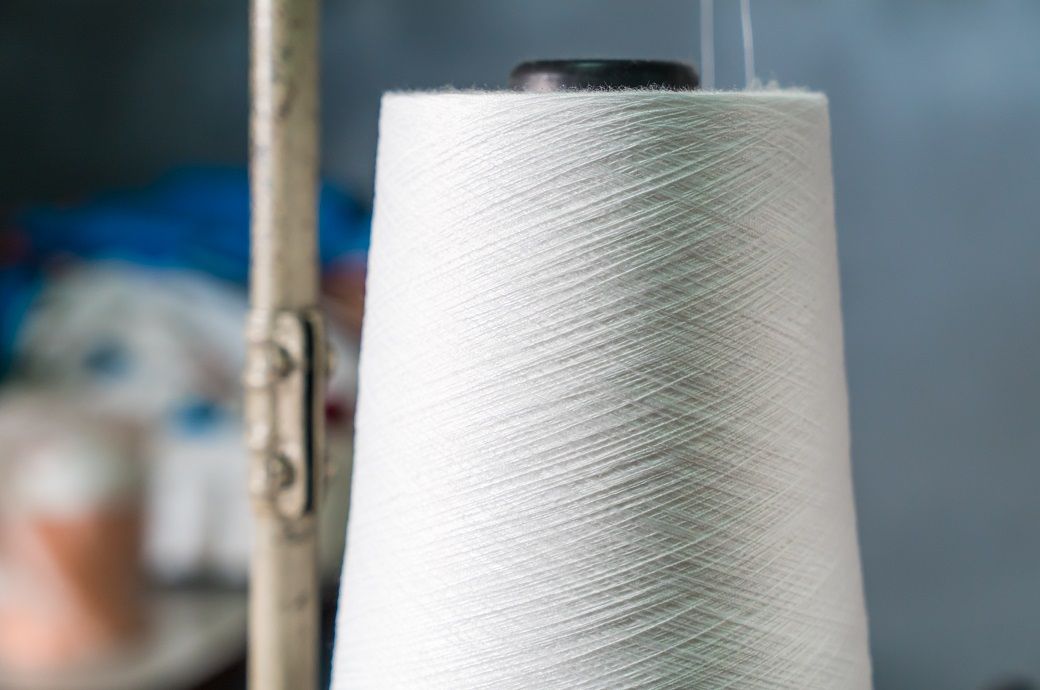
In Ludhiana, the polyester spun yarn market saw a downward trend after a price cut of ₹4 per kg in polyester staple fibre (PSF). However, polyester-cotton (PC) yarn and recycled polyester yarn remained stable. A trader from Ludhiana told Fibre2Fashion, “Mills have sufficient orders from the domestic market. There is no pressure from slow export demand due to the ongoing festival season in the country. However, polyester spun yarn prices fell after a reduction in the mill rate for polyester staple fibre by leading manufacturers.” Despite the reduction in virgin fibre prices, recycled polyester fibre did not face any pressure.
In Ludhiana, 30 count PC combed yarn (48/52) traded at ₹211-221 (approximately $2.52-2.64) per kg (GST inclusive); 30 count PC carded yarn (65/35) at ₹198-208 (approximately $2.37-2.49) per kg; 20 recycled polyester fibre at ₹108-120 (approximately $1.29-1.43) per kg; 30 count polyester spun at ₹160-168 (approximately $1.91-2.01) per kg (GST inclusive); and recycled polyester fibre (PET bottle fibre) at ₹73-75 (approximately $0.87-0.90) per kg.
In Surat, the polyester yarn market remained steady due to consistent demand from the consumer industry. According to market sources, lower polyester fibre prices did not lead to a reduction in polyester yarn prices. The festival season offers a ray of hope for better demand from spinning mills. Currently, mills are receiving regular but limited buying.
In Surat, 30 count polyester spun yarn was traded at ₹147-148 (approximately $1.76-1.77) per kg (GST extra); 40 count poly spun yarn at ₹160-161 (approximately $1.91-1.93) per kg; 50/48 fully drawn yarn (FDY) at ₹114-115 (approximately $1.36-1.38) per kg; 75/72 FDY at ₹106-107 (approximately $1.27-1.28) per kg; 75 bright yarn at ₹105-106 (approximately $1.26-1.27) per kg.
Viscose yarn prices declined in the Mumbai and Surat markets due to cheaper imports and weaker demand. Viscose yarn prices eased by ₹2-3 per kg in Mumbai, and by ₹1-2 per kg in Surat. Trade sources stated that viscose yarn prices are falling in the Chinese market. Freight charges are also decreasing, lowering the landed cost by ₹8-10 per kg from peak freight rates. A trader from Mumbai noted that festival demand has concluded at the fabric manufacturing level, and power loom owners will soon begin production for the upcoming summer season.
In Mumbai, imported 30 count viscose vortex yarn was priced at ₹190-196 (approximately $2.27-2.34) per kg; and local 30 count ring-spun viscose yarn at ₹195-201 (approximately $2.33-2.40) per kg in this market. In Surat, 30 count viscose compact yarn (local) was sold at ₹203-205 (approximately $2.43-2.45) per kg (GST extra) and 30 viscose vortex yarn at ₹201-203 (approximately $2.40-2.43) per kg.
In north India, cotton prices eased by ₹40-50 per maund (37.2 kg) as buyers slowed down purchases of old cotton following the arrival of new cotton. The local market weakened despite stronger ICE cotton. Traders said old cotton prices softened as cotton arrivals increased in Haryana. Both new and old cotton arrivals are rising in the state, with lower Rajasthan also seeing small quantities of new arrivals.
Haryana received approximately 1,000 bales of 170 kg cotton, consisting of 500 new bales and 500 old bales. Lower Rajasthan received around 200 bales of new cotton, with arrivals expected to increase in the first week of next month.
Cotton prices in Punjab ranged from ₹5,875 to ₹5,880 (approximately $70.25-70.31) per maund, while in Haryana, prices ranged from ₹5,775 to ₹5,780 (approximately $69.05-69.11). In upper Rajasthan, cotton was priced between ₹5,450-5,875 (approximately $65.17-70.25) per maund, while Bikaner line cotton sold for ₹5,850-5,950 (approximately $69.95-71.15) per maund. In lower Rajasthan, cotton was priced between ₹55,200 and ₹58,200 (approximately $660.04-695.91) per candy (356 kg).
ALCHEMPro News Desk (KUL)
Receive daily prices and market insights straight to your inbox. Subscribe to AlchemPro Weekly!